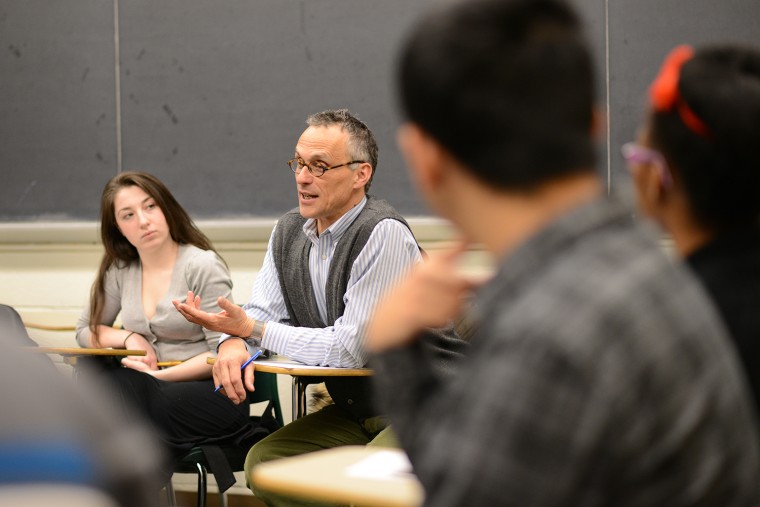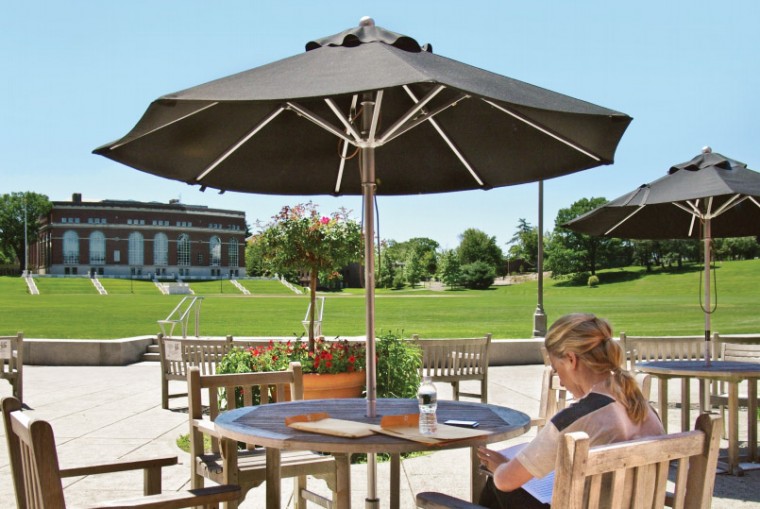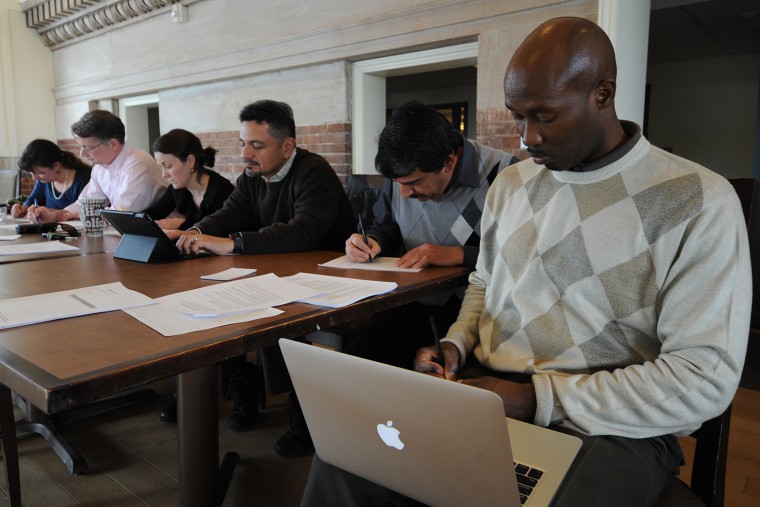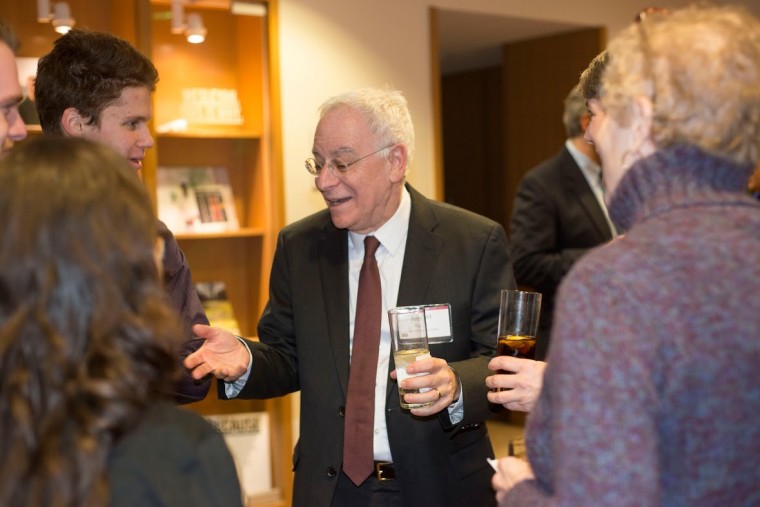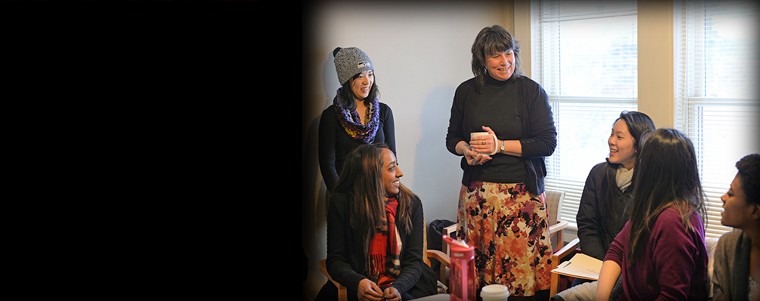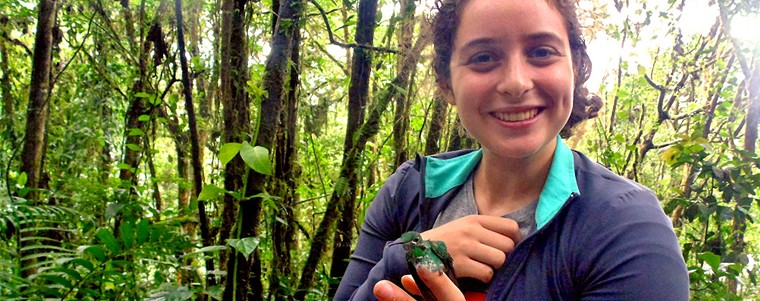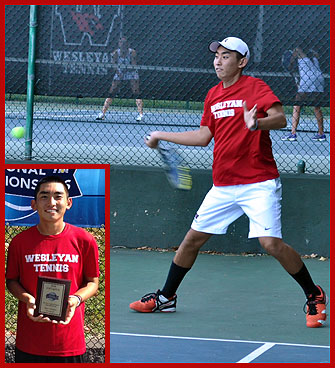(more…)
Registration is open for the 59th Annual Wesleyan Writers Conference. This year, the conference is offering scholarships and fellowships for alumni and other members of the Wesleyan community, including six scholarships for undergraduates. The conference, held June 10-14, welcomes established writers, new writers, and everyone interested in the writer's craft, and features seminars, workshops, readings and manuscript consultations. Sessions include novel, short story, poetry, nonfiction, journalism and special sessions such as writing about science and medicine. "This is a wonderful opportunity to start a new project or develop your current work with the help of distinguished writers, editors, agents and publishers," said…
About 20 faculty, staff and graduate students participated in a contemplative pedagogy workshop and discussion Feb. 19 in the Allbritton Center. The workshop, titled "Practically impractical: Contemplative practices in the classroom – A Faculty and Graduate Student Teaching Workshop" was taught by Michelle Francl, professor of chemistry on the Clowes Fund for Science and Public Safety at Bryn Mawr College. Read more about the workshop here. Photos of the workshops are below: (Photos by Olivia Drake and Aviva Hirsch '16) (more…)
Peter Rutland, the Colin and Nancy Campbell Professor in Global Issues and Democratic Thoughts, writes in the Mirror (U.K.) about the threat to the West by Russian President Vladimir Putin. He considers the comparison made by British Defense Secretary Michael Fallon to the Islamic State. While "Putin's people are not beheading Christians or burning captives alive," writes Rutland, Russia has nuclear weapons — lots of them. "And is willing to use them if necessary," he writes. "Deterrence only works if both sides see each other as unwilling to risk war. And [Putin] believes the West will not risk nuclear conflict over where to…
Phil Resor, associate professor of earth and environmental sciences, and Gus Seixas '10 are co-authors of "Constraints on the evolution of vertical deformation and Colorado River incision near eastern Lake Mead, Arizona, provided by quantitative structural mapping of the Hualapai Limestone," published in the February 2015 issue of Geosphere, Vol. 11, pages 31-49. The paper includes research from Seixas's honors thesis at Wesleyan. In this study, the authors quantify the structural geometry of Hualapai Limestone, which was deposited in a series of basins that lie in the path of the Colorado River. The limestone was deformed by by a fault pair…
Richard Grossman, professor of economics, is featured in a radio interview with Share Radio in London Feb. 19. In the interview, Grossman talks about the consequences of the European Central Bank's new quantitative easing (QE) policy, which may stimulate an economy when a standard monetary policy has become ineffective. The ECB's action follows in the footsteps of the central banks of Japan, the United Kingdom, and the United States, which also have used quantitative easing in the 2000s. A concern that has been raised about the introduction of QE is that persistent low interest rates will lead to another boom-bust…
Bill Craighead, assistant professor of economics, is the co-author of "Current Account Reversals and Structural Change in Developing and Industrialized Countries," published in the February issue of The Journal of International Trade and Economic Development. The paper compares the experience of high-income and developing countries in adjusting current account deficits, which measure how much they are relying on external borrowing. In both types of country, construction is the most sensitive sector to the current account. On average, adjustments in developing countries are more severe, but that is mainly due to the effects of currency crises. When you take those out, they…
(more…)
Early this year, Gary Shteyngart embarked on an experiment for The New York Times: For a week straight, he would "subsist almost entirely on a diet of state-controlled Russian television, piped in from three Apple laptops onto three 55-inch Samsung monitors in a room at the Four Seasons Hotel in Manhattan." Assistant Professor of Art Sasha Rudensky documented this experiment in a series of photographs that accompany the story. Here is Shteyngart lying in bed, feet encased in hotel slippers, while Russian President Vladamir Putin's stern face fills three towering television screens. Here Shteyngart is dining on Wagyu beef slices and sipping pinot noir…
#THISISWHY About 30 Wesleyan students and faculty gathered for a Wesleyan Women in Science (WesWIS) Tea Reception Feb. 19 at the Wasch Center. Women in Science is a student group composed of undergraduates, post-docs, staff and faculty dedicated to issues affecting women in science. The group is open to all majors and genders. During the gathering, guest speaker Michelle Francl, professor of chemistry on the Clowes Fund for Science and Public Policy at Bryn Mawr College, spoke to the group about physicist and chemist Marie Curie, the first woman to win a Nobel Prize. Francl handed out copies of her commentary titled…
#THISISWHY In this Q&A, we speak with Hannah Steinberg from the Class of 2016. Q: Hannah, you studied abroad through the School for Field Studies’ (SFS) Costa Rica program in Spring 2014. Why did you choose this program and why did you decide to conduct research during your study abroad experience? A: I chose SFS Costa Rica because I wanted to go to Latin America to improve my Spanish skills and get practical hands-on experience in biological science. Another cool part of the program was that it was situated on a sustainable orange and mango farm in central Costa Rica,…
Wesleyan men's tennis will have ample opportunity this spring to test its mettle. Head coach Mike Fried, who set up a challenging schedule for his young Cardinals, is hoping it will achieve the desired effect. "When trying to bring the program up to the top national mix, we needed to do something more competitive with our spring training trip," he said. In past years, the Cardinals traveled to Orlando, Fla. during March break, playing 4-6 matches against high-level Divisions I, II, III and NAIA opponents, but not the top teams in Division III. Breaking from tradition, (more…)


